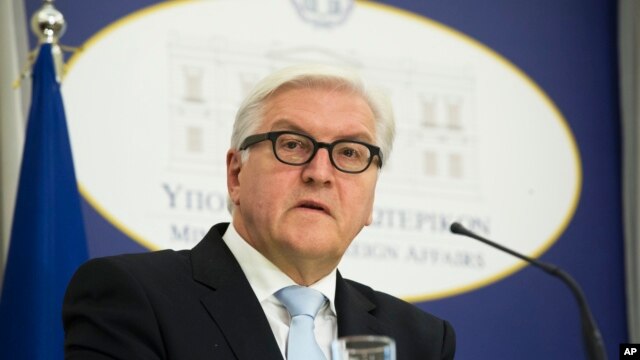
German Foreign Minister Frank-Walter Steinmeier speaks during a joint press conference with his Greek counterpart Nikos Kotzias after their meeting in Athens, Oct. 29, 2015.
Germany's foreign minister said Thursday that the European Union needs a common border protection policy and to be ready to share the migrant and refugee burden fairly.
During his visit to Greece, where he met with Greek President Prokopis Pavlopoulos in Athens, Frank-Walter Steinmeier said shifting the blame to each other was not helping anybody.
Steinmeier said that European countries need to come together to deal with the worst refugee crisis since World War II that has pushed Europe to its limits.
"I am convinced that we won't get anywhere if we just point the finger at each other, transit countries against countries further down the line, Greece against the western Balkans, the western Balkans against Germany and Austria," he said. "This will not lead us anywhere. We have got to find a common European refugee policy with common procedures, common standards and with common, effective border protection."
Almost all the migrants from the conflict- and poverty-ridden Middle East, Africa and Asia are entering the EU via Greece and the Balkans, aiming for Germany, Sweden and the Netherlands as their final destinations.
Last month the EU approved a plan to accommodate 120,000 migrants and refugees across its 28 nations, but the EU's newest members in eastern Europe have resisted calls to share the burden. Although Germany has pledged to take in 800,000 asylum seekers, Steinmeier said Berlin could not deal with the crisis alone.
"I think that to meet all these targets, we don't need less Europe but more Europe and we have to be ready to share the burden fairly," he said.
EU leaders agreed on October 25 at a mini-summit in Brussels to cooperate in managing migrant flows through Greece and the Balkans.
The U.N. High Commissioner for Refugees reports that more than 700,000 people have arrived in Europe this year and more than 3,000, including children, have lost their lives crossing the Mediterranean Sea.
Save the Children said in a statement Thursday that more than 70 children, including seven on Wednesday night, have drowned in the attempt to reach Greece since Aylan Kurdi, a three-year-old Syrian boy of Kurdish ethnic background whose image made global headlines, was found dead on a beach.
The charity organization is calling for more resources and immediate support to prevent deaths of hypothermia and exposure.
Save the Children is also calling for the creation of well-managed safe and legal routes for refugees and migrants, being particularly concerned about approximately 12,000 unaccompanied children who have landed on European shores this year alone. |
|
